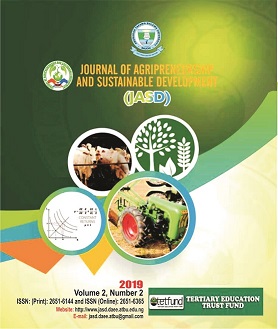ANALYSIS OF FARM INCOME OF BENEFICIARIES AND NON-BENEFICIARIES OF HADEJIA VALLEY IRRIGATION PROJECT IN JIGAWA STATE, NIGERIA
DOI:
https://doi.org/10.59331/jasd.v2i2.76Keywords:
Beneficiaries, Farm, Hadejia, Income, Irrigation, ProjectAbstract
The study examined the impact of Hadejia Valley irrigation project (HVIP) on farm income of beneficiaries in Jigawa State, Nigeria. From the list of 7036 respondents, 207 project beneficiaries and 146 non-beneficiaries were selected using a multi-stage random sampling making a total of 353 as the sample size of the study. Data were obtained using structured questionnaire and analyzed using descriptive statistics and F-test statistics. The results showed that beneficiaries and non-beneficiaries had a mean age of 47 and 45 years, a mean household size of 15 and 21 persons, educational levels of 8 and 7 years and mean off-farm income of N137,797.00 and N237,104 .00, respectively. The study also established 30 and 24 years of irrigation farming experience, farm sizes of 3.2 and 2.1 hectares, N33,641.00 and N55, 709.00 spent in hiring labour, farm distances of 3 and 0.9 kilometres, 5 and 3 extension visits per season, a mean of N52,771.00 and N50,205.00, N50,205.68 and N32,422.33 as credit and subsidy, respectively. Membership of cooperative associations indicated a mean of 0.8 and 0.5 for beneficiaries and non-beneficiaries, respectively. In the study area, the average total cost of production per hectare of beneficiaries and non-beneficiaries were N527,179.00 and N363, 191.00, and net farm income of N814,852.00 and N403,753.00 realized, respectively. The result of the F-test statistics on cost of production indicated F1,410 of 68.3> F at critical value of 3.86 at p = 5. 66E07 and farm income F1,410 of 726.3 >F at critical value of 3.86 at p = 8.56E-93 (P<0.05) level of significance. This suggested a significant impact of Hadejia valley irrigation project on farm income of the respondents. The study concludes that the project has had positive impact on the farm income of the project beneficiaries. It therefore, recommends that government should encourage income sources diversification; measures should be taken by the project authority to address inadequate access to extension. The project beneficiaries should form farmers’ co-operatives and measures should be taken by the project authorities to promote cost-saving technologies that encourage release of labour from irrigation to reduce the cost of production.
Downloads

Downloads
Published
How to Cite
Issue
Section
License
Copyright (c) 2022 Journal of Agripreneurship and Sustainable Development

This work is licensed under a Creative Commons Attribution 4.0 International License.






